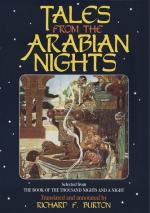[FN#146] This couplet has repeatedly occurred: in the preceding volume, Night cdv. (Suppl. iv. 172); and in The Nights (proper), vol. vi. 246. Here I have quoted Lane (A.N. iii. 220), who has not offered a word of comment or of explanation concerning a somewhat difficult couplet.
[FN#147] The plur. masc. for the sing. fem.: see vol. vii. 140.
[FN#148] He speaks after the recognised conventional fashion, as if reporting the camp-shift of a Badawi tribe.
[FN#149] See vol. i. 25 for the parallel of these lines.
[FN#150] The text inserts here, “Saith the Reciter of this adventure and right joyous history strange as rare,” etc.
[FN#151] Scott, in the “Story of the Sultan, the Dirveshe, and the Barber’s son” (vi. 348), calls the King “Rammaud.” The tale is magical and Rosicrucian, laid somewhat upon the lines of “The Physician Duban”; i.45.
[FN#152] This is the custom among Eastern Moslems: the barber, after his operations are over, presents his hand-mirror for the patient to see whether all be satisfactory, saying at the same time “Na’iman"=may it be pleasurable to thee! The customer answers “Allah bring thee pleasure,” places the fee upon the looking-glass and returns it to the shaver. For “Na’iman” see vol. ii. 5.
[FN#153] The least that honest Figaro expected to witness was an attempt upon the boy’s chastity.
[FN#154] In text “Tazaghzagha,” gen.=he spoke hesitatingly, he scoffed. [I read the words in the text: “Tazaghghara fihi.” The Kamus gives “Zaghara-hu"=he seized it by force, he took hold of him with violence, and this present fifth form, although not given in the Dictionaries, has doubtlessly the same meaning. Popularly we may render it: he pitched into him.—St]
[FN#155] In the text “Kazanat” (plur. of “Kazan"), afterwards written “Kazat” (a clerical error?). They are opposed to the “Kawalib"=moulds. [See note to p. 17.—St.]
[FN#156] “Akhraja min Kulahi-hi (Kulah?) busah.”
[FN#157] “Akhaza min-ha ‘ala ma’ lakati ’l-Hilal shay misl al-Jinnah.” [I have no doubt that “Kulah” is meant for “Kulah,” a Dervish’s cap. “Busah” puzzles me. I am inclined to take it for a reed used as a case or sheath, as we shall see p. 263 of the Ms. Prince Yusuf uses a “Kasabah” or reed to enclose a letter in it. “Mi’lakat (popular corruption for ‘Mil’akat’) al-Hilal” may be the spoon or hollow part of an ear-picker, Hilal being given by Bocthor as equivalent for “cure-oreille.” Lastly for “al-Jinnah” I would read “al-Habbah"=grain. The article before the word may indicate that a particular grain is meant perhaps “al-Habbat al-halwah"=anise seed, or that it stands for “al-Hubbah,” according to Lempriere (A Tour to Marocco, London 1791, p. 383) a powder employed by the ladies of Marocco to produce embonpoint.—St.]
[FN#158] So even in our day Mustafa bin Ism’ail who succeeded “General Khayru ’l-Din” as Prime Minister to “His Highness Mohammed al-Sadik, Bey of Tunis,” began life as apprentice to a barber, became the varlet of an officer, rose to high dignity and received decorations from most of the European powers.




